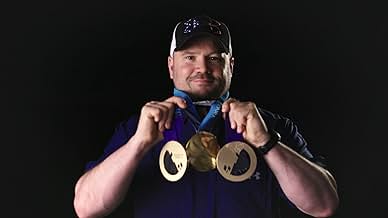Füge eine Handlung in deiner Sprache hinzuA look at the mental health challenges Olympic athletes often face.A look at the mental health challenges Olympic athletes often face.A look at the mental health challenges Olympic athletes often face.
Empfohlene Bewertungen
While we're all missing out on this year's Summer Olympics due to Covid-19, this documentary is well needed.
I never knew there was such a thing as "Olympic Blues" but it makes sense that it would happen.
I hope they can all get the help that is needed. I wonder how the rest of the world deals with mental health for their athletes.
Wonderful documentary; it really makes you think.
I never knew there was such a thing as "Olympic Blues" but it makes sense that it would happen.
I hope they can all get the help that is needed. I wonder how the rest of the world deals with mental health for their athletes.
Wonderful documentary; it really makes you think.
"The Weight of Gold" (2020 release; 60 min.) is a documentary about the mental health issues that Olympian athletes past and present have been and are struggling with. As the movie opens, we see aerial footage of Tokyo, where the 2020 Olympics should be taking place at this very minute but of course have been postponed until next year due to COVID-19. The coronavirus has impacted many people's mental health, including athletes. Micheal Phelps, the most decorated Olympic athlete in history, comments "I've been thinking about mental health issues a lot lately." We then go back in time and hear Michael, age 15, talk about his ambition to win gold at the Athens Olympics. Likewise from other athletes like Apolo Ohno, Shaun White, Sasha Cohen, etc "I didn't develop any outside interests, comments Cohen. "I was driven by a fear of failure", observes Ohno. At this point we are less than 10 min. into the documentary.
Couple of comments: this is the latest from long-time sports documentarian Brett Rapkin. Here he looks at what Olympic athletes go through to try and reach the top, and at what cost it comes, both physically and mentally. Please note that Michael Phelps is credited as Executive Producer, and also does the narration (in addition to being featured prominently). What is absolutely remarkable is how so many of them bring a similar narrative: basically being left to their own devices, even after repeated cries for help to the US Olympic Team, which appears to simply not care one way or another. Sadly for some athletes it became too much to bear. For those that did make it, such as Michael Phelps and Sasha Cohen (both in their mid-30s now), there is a great awareness and recognition that "it's okay not to be okay" and that the stigma of mental health issues among Olympic athletes needs to be talked about openly.
"The Weight of Gold" premiered this week on HBO and is now available on HBO On Demand, Amazon Instant Video and other streaming services. If you have any interest in mental health issues or simply how life for Olympic athletes is not always roses and sunshine, I'd readily suggest you check this out and draw your own conclusion.
Couple of comments: this is the latest from long-time sports documentarian Brett Rapkin. Here he looks at what Olympic athletes go through to try and reach the top, and at what cost it comes, both physically and mentally. Please note that Michael Phelps is credited as Executive Producer, and also does the narration (in addition to being featured prominently). What is absolutely remarkable is how so many of them bring a similar narrative: basically being left to their own devices, even after repeated cries for help to the US Olympic Team, which appears to simply not care one way or another. Sadly for some athletes it became too much to bear. For those that did make it, such as Michael Phelps and Sasha Cohen (both in their mid-30s now), there is a great awareness and recognition that "it's okay not to be okay" and that the stigma of mental health issues among Olympic athletes needs to be talked about openly.
"The Weight of Gold" premiered this week on HBO and is now available on HBO On Demand, Amazon Instant Video and other streaming services. If you have any interest in mental health issues or simply how life for Olympic athletes is not always roses and sunshine, I'd readily suggest you check this out and draw your own conclusion.
'The Weight of Gold' (2020) is a highly personal and gut-wrenching documentary covering a topic that is everywhere and rarely acknowledged in sports, mental health.
This film focuses on Olympians and their personal experiences and battles with mental health. I disagree with some other reviewers in that this film does not not say other highly successful individuals not in the Olympics do not suffer as bad or that Olympians suffer worse than anyone else. This documentary is made by Olympians to help shed some light on their own struggles, and is being made for future Olympians to help them with their own journeys as they chase their dream.
Narration and personal stories bring forth the widespread challenges members of the U. S. Olympic team face in their lives. Some have more sponsorships and post-Olympic opportunities while others do not.
This film can be tough for the viewer especially if they or someone they know has struggled with their mental health. And even in this film, Steven Holcomb, who speaks of his own personal experiences with other athletes ends up losing his own battle while this film is still being made.
This film is tragic and at times tough to watch if you can understand their mindsets. Since its release there has been progress made as Covid-19 has pushed mental health into the spotlight more but hopefully this film can at the very least serve as a teaching tool for all past, current, and future Olympic athletes regardless of their nation.
This film focuses on Olympians and their personal experiences and battles with mental health. I disagree with some other reviewers in that this film does not not say other highly successful individuals not in the Olympics do not suffer as bad or that Olympians suffer worse than anyone else. This documentary is made by Olympians to help shed some light on their own struggles, and is being made for future Olympians to help them with their own journeys as they chase their dream.
Narration and personal stories bring forth the widespread challenges members of the U. S. Olympic team face in their lives. Some have more sponsorships and post-Olympic opportunities while others do not.
This film can be tough for the viewer especially if they or someone they know has struggled with their mental health. And even in this film, Steven Holcomb, who speaks of his own personal experiences with other athletes ends up losing his own battle while this film is still being made.
This film is tragic and at times tough to watch if you can understand their mindsets. Since its release there has been progress made as Covid-19 has pushed mental health into the spotlight more but hopefully this film can at the very least serve as a teaching tool for all past, current, and future Olympic athletes regardless of their nation.
It's not exclusive to Olympic caliber athletes- any successful athlete-be it football, baseball, basketball, bowling, etc., to get to a level of top tier performances, when the end comes, you're left with a whole lot of nothing.
For that matter, top level scientists, researchers, academics, etc., to get to that level, you have to be singularly focused on a goal that consumes you whole.
The higher you climb in your particular field, the farther you find yourself plummeting when the end of that particular road ceases to exist. The key to success in most cases is to develop interests and friendships outside your area of expertise, away from those people and things that are hanging around solely due to your successes. The hard part is, finding those things and people because the person is so focused on the outcome they're not realizing how vital those things are until it's too late.
We are in desperate need of mental health care for all, not just olympians. We have homeless vets living on the streets facing the exact same crises of the mind that these Olympians face-the inevitability that what was your entire life is now over and coping with everyday life is an impediment.
For that matter, top level scientists, researchers, academics, etc., to get to that level, you have to be singularly focused on a goal that consumes you whole.
The higher you climb in your particular field, the farther you find yourself plummeting when the end of that particular road ceases to exist. The key to success in most cases is to develop interests and friendships outside your area of expertise, away from those people and things that are hanging around solely due to your successes. The hard part is, finding those things and people because the person is so focused on the outcome they're not realizing how vital those things are until it's too late.
We are in desperate need of mental health care for all, not just olympians. We have homeless vets living on the streets facing the exact same crises of the mind that these Olympians face-the inevitability that what was your entire life is now over and coping with everyday life is an impediment.
Top-Auswahl
Melde dich zum Bewerten an und greife auf die Watchlist für personalisierte Empfehlungen zu.
- How long is The Weight of Gold?Powered by Alexa
Details
- Erscheinungsdatum
- Herkunftsland
- Offizieller Standort
- Sprache
- Auch bekannt als
- Altının Ağırlığı
- Produktionsfirma
- Weitere beteiligte Unternehmen bei IMDbPro anzeigen
- Laufzeit1 Stunde
- Farbe
Zu dieser Seite beitragen
Bearbeitung vorschlagen oder fehlenden Inhalt hinzufügen























